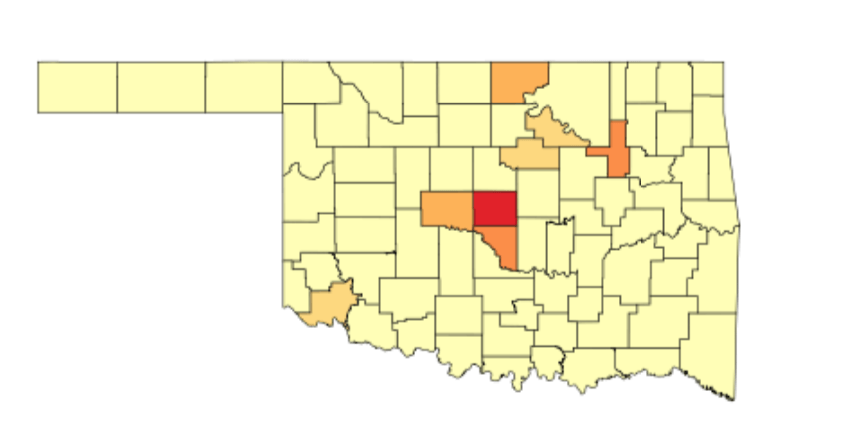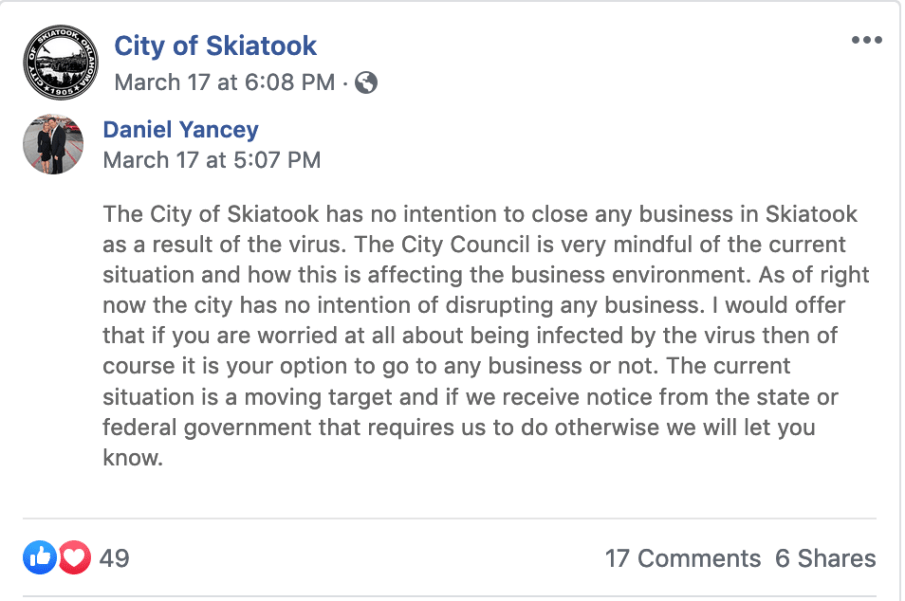
 As COVID-19 continues to spread across Oklahoma, some of the cities that initially held out on requiring restaurants and some other businesses to close to prevent the spread of the disease have started to change course.
As COVID-19 continues to spread across Oklahoma, some of the cities that initially held out on requiring restaurants and some other businesses to close to prevent the spread of the disease have started to change course.
On Thursday, Broken Arrow, Bixby, Sand Springs and others issued mayoral proclamations that required businesses like restaurants, bars, entertainment venues to close prevent the spread of the virus, which Tulsa Health Department Director Bruce Dart said is more than three times as infectious as the flu.
Though some municipalities in the Tulsa area have now adopted the restrictions, others have yet to do so. Claremore, Coweta, and Skiatook have issued some level of emergency preparedness, but have yet to issue proclamations requiring businesses to close.
Dart said Thursday he had sent a letter to all surrounding communities asking them to shut down restaurants.presser
“The City Council is very mindful of the current situation and how this is affecting the business environment,” Skiatook City Manager Dan Yancey posted on Facebook on Tuesday. “As of right now the city has no intention of disrupting any business. I would offer that if you are worried at all about being infected by the virus then of course it is your option to go to any business or not.”

A March 17 Facebook message from Skiatook City Manager Daniel Yancey regarding the city’s plans to deal with the coronavirus outbreak. Courtesy/Facebook
Tulsa Mayor G.T. Bynum and Oklahoma City Mayor David Holt both declared civil emergencies in their respective cities on Monday, and later issued declarations requiring that those types of businesses close or go to curbside service. Though some smaller cities have followed suit, others were slow to do so, expressing concern about a shutdown’s effect on local businesses.
On Monday, Broken Arrow Mayor Craig Thurmond issued an order that all city buildings and city-permitted public gatherings be shut down or cancelled but stopped short of ordering businesses to close, though Dart had requested the city issue a proclamation similar to Tulsa’s.
The following day, during a city council meeting, council members said they had received multiple calls from businesses asking the city to not shut down businesses, and some members of the public at the meeting urged the mayor not to issue a proclamation closing businesses in Broken Arrow.
“I am still concerned by putting these stipulations and moving us in this direction where you are going to begin to infringe on small business owners, who are the lifeblood of this community,” said Broken Arrow resident and business consultant Lori Gracey. “And if Tulsa does it, it doesn’t mean that Broken Arrow has to do it. I think we need to protect our citizens’ rights.”
Rhonda Vuillemont-Smith, a Broken Arrow business owner and president and founder of the conservative Tulsa 9.12 Project, went a step further during the Tuesday meeting and said that Broken Arrow businesses could actually benefit from Tulsa’s decision to shut its restaurants and bars.
“I think it (a business shutdown) would be very detrimental to Broken Arrow,” Vuillemont-Smith, who was also a 2012 Republican candidate for State Senate, told the council. “I think we can shine now. We always shine, but I think that we can bring people in that maybe might get acquainted with some of our businesses that might not have otherwise because they go to Tulsa.”
After Tuesday’s Broken Arrow City Council meeting, Ward 1 Councilwoman Debra Wimpee announced on Facebook that the city of Broken Arrow would not be requiring businesses to close for the time being and thanked both Gracey and Vuillemont-Smith “for speaking up on behalf of our Constitution and our local businesses.”
Two days later, health officials announced the first COVID-19-related death in the state in Tulsa, and the first confirmed case of a person from Broken Arrow testing positive for the disease.
During a press conference on Thursday morning, Tulsa Mayor Bynum addressed the issue of suburban municipalities not closing businesses that may lead to the spread of the disease, and said making the proclamation was “one of the hardest decisions I’ll ever have to make as a mayor.”
Bynum also said many of the communities that decided not to adopt similar measures would end up sending their sick residents to Tulsa hospitals.
“Today, I’m hearing a lot of anger from people directed at some of our suburban communities, I think around some hesitation to adopt similar practices that would slow the spread of the virus, when I think there’s an acknowledgement that there will not be hesitation to send residents of those communities to utilize beds and respirators in Tulsa hospitals,” Bynum said. “I can understand that anger and frustration when we as a community are shouldering this sacrifice and doing it so we can keep those beds and respirators available for those who need it most. And there are others who seem to hesitate on whether or not they should do it.”
Bynum questioned the wisdom of ignoring the advice of national, state and local health experts to limit exposure as much as possible.
“You have that advice on one hand, and on the other hand, you’ve got bumper sticker slogans and out of context quotes from founding fathers,” Bynum said. “I don’t think that’s a hard decision to make, if you’re focused on what should be the foremost responsibility for all of us, which is the public safety of our fellow Tulsans and the people that live in northeast Oklahoma.”
The Broken Arrow City Council called an emergency meeting on Thursday. This time, Dart showed up to the meeting in person and addressed the council, at the invitation of the city.
“You’re probably sick and tired of talking about COVID-19. But it’s here,” Dart told the council. “We’re really in critical mass. The cases we talked about this morning, we haven’t been able to find any travel-related exposure. So we can only conclude they were exposed in the community. So we can now say we have community spread and community infection.”
Because there is no natural immunity to the virus, the only way to stop it and minimize the impact on people, businesses and government is to try and prevent its spread, Dart said.
“The only way at this juncture, in lieu of science that we have for other ailments like vaccines and therapies, all we can do now is try and prevent exposure or try and limit exposure. One way we can do that is to ask our communities to prevent people from gathering,” Dart said.
“Bottom line, as government we have a responsibility to protect our citizens, as difficult as that may be,” he said. “If we don’t get a handle on this and stop the transmission and break that transmission, our health care system will be overwhelmed. They won’t be able to handle the surge.”
Broken Arrow Council members and the Thurmond said they had numerous calls, emails and social media interactions since Tuesday condemning the decision not to close businesses.
The council voted unanimously to support Thurmond signing a proclamation that would close Broken Arrow’s restaurants, bars, gyms and entertainment venues as of 11:59 p.m. Friday.

